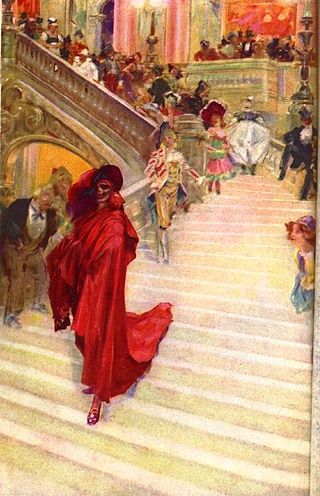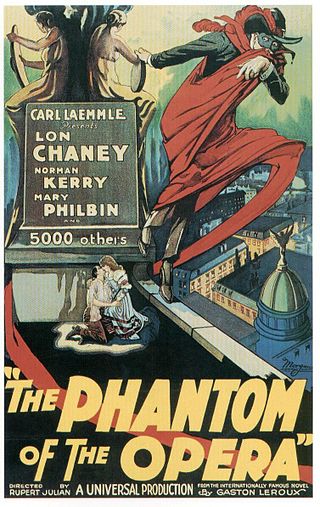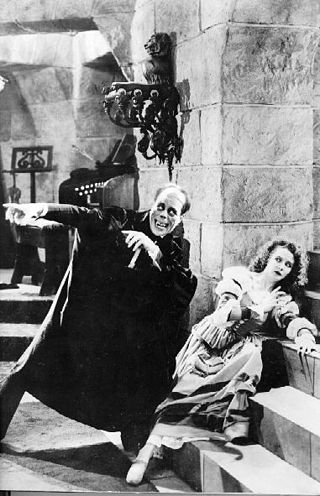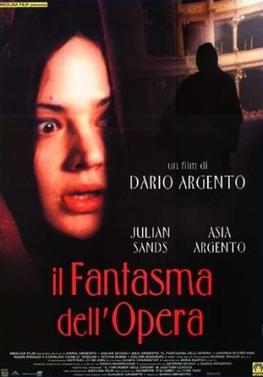
The Phantom of the Opera is a novel by French author Gaston Leroux. It was first published as a serial in Le Gaulois from 23 September 1909 to 8 January 1910, and was released in volume form in late March 1910 by Pierre Lafitte. The novel is partly inspired by historical events at the Paris Opera during the nineteenth century, and by an apocryphal tale concerning the use of a former ballet pupil's skeleton in an 1841 production of Carl Maria von Weber's Der Freischütz. It has been successfully adapted into various stage and film adaptations, most notable of which are the 1925 film depiction featuring Lon Chaney, and Andrew Lloyd Webber's 1986 musical.

The Phantom of the Opera is a musical by Andrew Lloyd Webber, lyrics by Charles Hart, additional lyrics by Richard Stilgoe, and a libretto by Lloyd Webber and Stilgoe. Based on the novel by Gaston Leroux, it tells the tragic story of beautiful soprano Christine Daaé, who becomes the obsession of a mysterious and disfigured musical genius living in the subterranean labyrinth beneath the Paris Opéra House.

The Phantom of the Opera is a 2004 musical romantic drama film based on Andrew Lloyd Webber's musical of the same name, which in turn is based on Gaston Leroux's novel, Le Fantôme de l'Opéra. Produced and co-written by Lloyd Webber and directed by Joel Schumacher, it stars Gerard Butler as the titular character, with Emmy Rossum, Patrick Wilson, Miranda Richardson, Minnie Driver, Simon Callow, Ciarán Hinds, Victor McGuire and Jennifer Ellison in supporting roles.

The Phantom of the Opera is a 1925 American silent horror film adaptation of Gaston Leroux's novel of the same name directed by Rupert Julian and starring Lon Chaney in the title role of the deformed Phantom who haunts the Paris Opera House, causing murder and mayhem in an attempt to make the woman he loves a star. The film remains most famous for Chaney's ghastly, self-devised make-up, which was kept a studio secret until the film's premiere. The picture also features Mary Philbin, Norman Kerry, Arthur Edmund Carewe, Gibson Gowland, John St. Polis and Snitz Edwards. The last surviving cast member was Carla Laemmle (1909–2014), niece of producer Carl Laemmle, who played a small role as a "prima ballerina" in the film when she was about 15 years old. The first cut of the film was previewed in Los Angeles on January 26, 1925. The film was released on September 6, 1925, premiering at the Astor Theatre in New York.

The Canary Trainer: From the Memoirs of John H. Watson is a 1993 Sherlock Holmes pastiche by Nicholas Meyer. Like The Seven Percent Solution and The West End Horror, The Canary Trainer was published as a "lost manuscript" of the late Dr. John H. Watson. In "The Adventure of Black Peter", an original Arthur Conan Doyle Holmes story from 1904, Watson mentions that his companion recently arrested "Wilson, the notorious canary-trainer, which removed a plague-spot from the East-End of London." This Wilson is not related to the eponymous character of Meyer's novel. Meyer's "trainer" is Erik, the principal figure of Gaston Leroux's 1910 novel The Phantom of the Opera. It is from this unchronicled tale that The Notorious Canary Trainers take their name.

Christine Daaé is a fictional character and the female protagonist of Gaston Leroux's 1910 novel The Phantom of the Opera and of the various adaptations of the work. Erik, the Phantom of the Opera and Viscount Raoul de Chagny both fall in love with her.
Carlotta is a fictional character from Gaston Leroux's 1910 novel The Phantom of the Opera. She is the leading soprano at the Paris Opera House who is criticised by the narrator and the Phantom for the lack of emotion in her performances.

The Phantom of the Opera is a 1989 American horror film directed by Dwight H. Little and based on Gaston Leroux's novel of the same name. The film is an updated and gorier version of Leroux's classic tale and stars Robert Englund as the titular character. The film was a critical and commercial failure.

Phantom is a musical with music and lyrics by Maury Yeston and a book by Arthur Kopit. Based on Gaston Leroux's 1910 novel The Phantom of the Opera, the musical was first presented in Houston, Texas in 1991.
Don Juan Triumphant is the name of a fictional opera conceived by the titular character of The Phantom of the Opera. In the 1986 musical The Phantom of the Opera by Andrew Lloyd Webber, the concept is expanded as an opera within a musical and the performance of it plays a major role in Act II of the storyline. The fictional piece draws major inspiration from Wolfgang Amadeus Mozart's Don Giovanni, yet the Phantom's opera is depicted as far more bleak and dark.

The Phantom of the Opera is a 1990 American two-part television miniseries directed by Tony Richardson and starring Charles Dance in the title role. It is adapted from Arthur Kopit's book from his stage musical Phantom, which is based loosely on Gaston Leroux's 1910 novel.

There have been many literary and dramatic works based on Gaston Leroux's 1910 novel The Phantom of the Opera, ranging from stage musicals to films to children's books. Some well known stage and screen adaptations of the novel are the 1925 film and the Andrew Lloyd Webber musical ; Susan Kay's 1990 Phantom is one of the best known novels and includes in-depth study of the title character's life and experiences.
Raoul, Vicomte de Chagny is a fictional character and one of the protagonists of Gaston Leroux's 1910 novel The Phantom of the Opera.
Meg Giry is one of the fictional characters from Gaston Leroux's 1910 novel The Phantom of the Opera. In the story, she is Madame Giry's daughter.

Erik is the titular male protagonist of Gaston Leroux's novel Le Fantôme de l'Opéra, best known to English speakers as The Phantom of the Opera. The character has been adapted to alternative media several times, including in the 1925 film adaptation starring Lon Chaney, the 1943 remake starring Claude Rains, the 1962 remake starring Herbert Lom and Andrew Lloyd Webber's 1986 musical.

The Phantom of the Opera is a 1998 Italian romance horror film directed by Dario Argento, adapted from the novel of the same name by Gaston Leroux. It is not to be confused with the 1987 film Opera, also directed by Dario Argento.

The Persian is a major character from the 1910 Gaston Leroux novel The Phantom of the Opera. In the book, he is the one who tells most of the background of Erik's history. Erik refers to him as the "daroga" and his memoirs are featured in five chapters of the novel. He is also considered Erik's only friend.

Lady of Burlesque is a 1943 American musical comedy mystery film directed by William A. Wellman, produced by Hunt Stromberg, and starring Barbara Stanwyck and Michael O'Shea. It is a faithful, if sanitized, adaptation of the 1941 novel The G-String Murders by burlesque performer and stripper Gypsy Rose Lee.
The Phantom of the Opera may refer to:

The Phantom of the Opera at the Royal Albert Hall is a 2011 British concert film adaptation of the 1986 stage musical The Phantom of the Opera by Andrew Lloyd Webber, itself based on the novel by Gaston Leroux.














